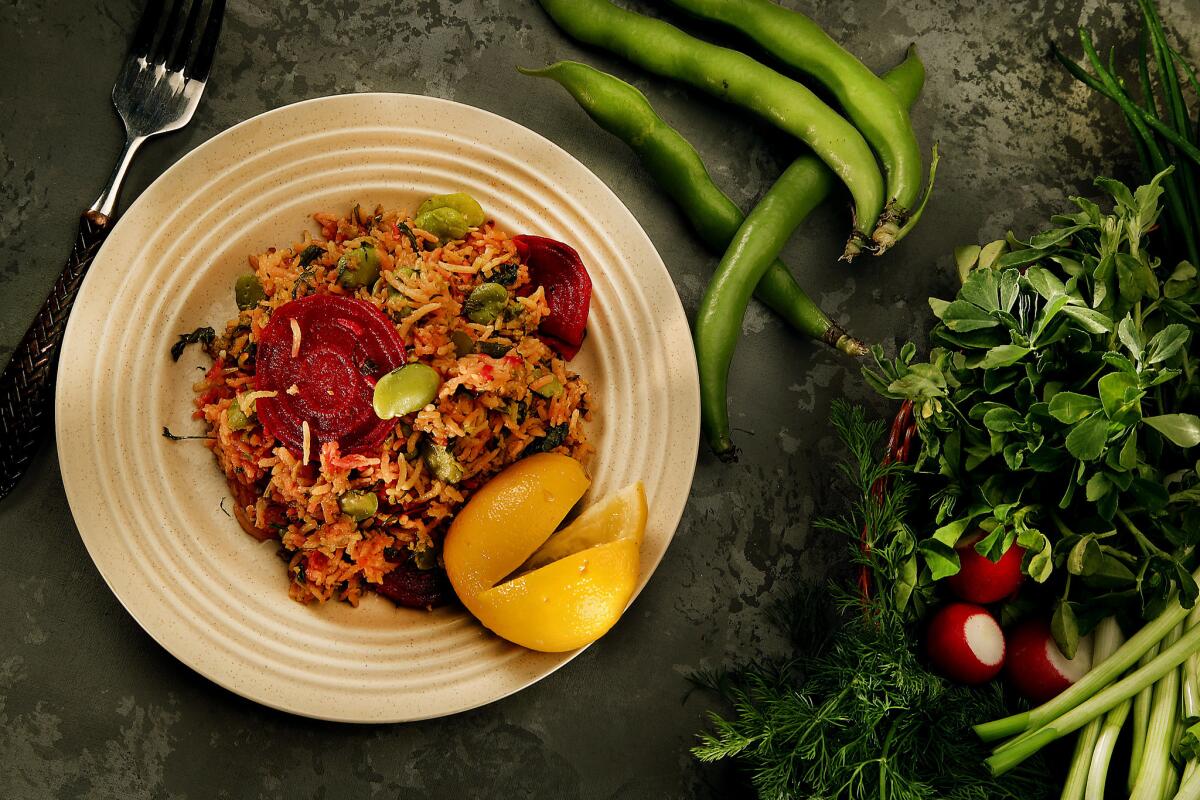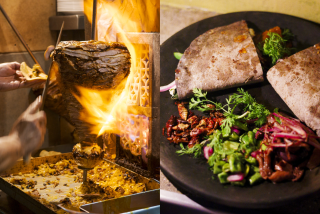Joan Nathan talks immigrant food and a recipe for matzo brei chilaquiles from her new cookbook, ‘King Solomon’s Table’

Cookbook author and journalist Joan Nathan needed all the experience she’s accumulated throughout her career tracing foods of the Jewish diaspora to take on her latest project.
With a mix of deep historical research combined with personal anecdotes of her many friends, relatives and colleagues around the world, her book, “King Solomon’s Table: A Culinary Exploration of Jewish Cooking From Around the World,” combines Nathan’s celebrated knowledge of all things related to Jewish food with her accessible storytelling voice. The book looks to the royal figure as both a symbolic and practical starting point from which to track Jewish ingredients, cooking methods and traditions, and how they cross-pollinated with others.
The book is also relevant to contemporary Los Angeles food culture.
I always think of L.A. as an organic city in the real sense.
— Joan Nathan
Nathan is familiar with and fond of this city. Two of the three children she and her husband, attorney Allan Gerson, raised in Washington, D.C., live here, and she visits frequently.
“King Solomon’s Table” took six years to write. Nathan is accustomed to connecting the dots of past and present and exploring the culinary traditions that fall under the complex banner of Jewish food, but this book proved to be a different beast. She chased down leads in far-flung locales, including India, Cuba and El Salvador.
“It’s so much fun to travel when your destination has a purpose,” she said with her typical enthusiasm.
So, after writing award-winning books such as “Jewish Cooking in America” and “Quiches, Kugels, and Couscous: My Search for Jewish Cooking in France,” why this 170-recipe tome now?
Recipe: Gondi kashi, rice with turkey, beets, fava beans and herbs »
“I wanted to do something on modern Jewish cooking, and I started thinking about the ingredients that people are using today,” Nathan recalled during a phone interview from her home in D.C. The conversation overlapped with Nathan baking hamantaschen in preparation for Purim.
Nathan mentioned pomegranate paste and date jam as examples of foods that have come full circle. Forging these connections “led me back to the origins of Jewish cooking,” she said, “which I realized was in Babylonia, not ancient Israel.”
The book’s introduction — which condenses millenniums of history into 16 pages — reflects Nathan’s signature mix of academic rigor and approachable style. Her research included visiting the Sterling Memorial Library at Yale to examine the three clay cuneiform tablets dating from about 1700 BC that compose what’s likely the world’s oldest known cookbook. (She learned of the tablets’ existence in “The Oldest Cuisine in the World,” a book by French scholar Jean Bottéro.)
the most exciting thing about the time that we live in is using all this immigrant food. You can enter so many different worlds.
— Joan Nathan
Nathan then explored more food-related parallels linking the biblical figure of Abraham to King Solomon, and to how people eat today.
“I knew from the 44 recipes they had nigella seeds, they had dill, they had beets. There was borscht. These recipes are really just lists of ingredients, not much technique.” Crops such as the chickpea is “not only the fruit of the past, but the fruit of the future,” she said.
“It’s casual food,” Nathan said, a quality always appreciated in Southern California. “Southern California cooks are used to using all kinds of ingredients. It’s a global marketplace.”

From Joan Nathan’s new book “King Solomon’s Table” Recipes : Chilaquiles -- Mexican “matzo” brei.
Recipe: Chilaquiles, Mexican “Matzo” Brei »
“King Solomon’s Table” includes specific L.A. ties. Chilaquiles were inspired by a phone conversation with Jonathan Gold, and she learned about gondi kashi, a Persian rice dish with turkey, beets, fava beans and herbs, during a visit with food blogger Tannaz Sassooni’s family in Encino.
“It’s an open city. I always think of L.A. as an organic city in the real sense. It just grows and grows, and it doesn’t have a plan.” So when it comes to food, these attributes are a blessing. “It’s an outside, warm city, so food spills over. My guess is it spills over from one sense to another, from homes to different neighborhoods.”
Nathan added, “the most exciting thing about the time that we live in is using all this immigrant food. You can enter so many different worlds. For me it’s great fun.”
Among her favorite local restaurants? Kobee Factory & Syrian Kitchen in Van Nuys, Providence, Mozza, Bestia, Gjelina, Langer’s, Wexler’s — and smaller, lesser known places her kids take her to when she’s in town.
Nathan has been here this past week, participating in a conversation with Evan Kleiman on her new cookbook at the Skirball Center. On Monday, she co-hosts an Italian seder with Akasha Richmond at AR Cucina in Culver City.
“King Solomon’s Table” is part of a journey along which Nathan doesn’t show any signs of slowing.
“I’ve been doing this my whole life and I’m never bored. It’s unbelievable,” Nathan said.
More to Read
Eat your way across L.A.
Get our weekly Tasting Notes newsletter for reviews, news and more.
You may occasionally receive promotional content from the Los Angeles Times.





